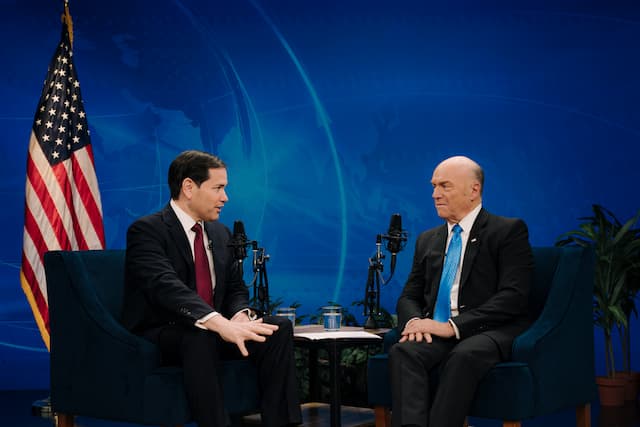From Church to Conference: The Subtle Erosion of Complementarian Roles; part 1
By Elizabeth Prata
SYNOPSIS
Over two decades of Christian observation, I warn that modern media, conferences, and celebrity culture have blurred biblical boundaries for women’s roles. As popularity replaces pastoral authority, false teaching spreads. I urge a return to scriptural clarity and complementarian order. This is a 2-part series.

INTRODUCTION
Jesus saved my soul later in life. I was 42-43. Even as a relatively new Christian, I have been observing over the past 20+ years of my Christian walk that though women have a prescribed role in life and church, that satan has been widening that boundary role incrementally but consistently.
With the advent of new media outlets, digital media, self-publishing, and the growth of parachurch organizations and conferences, this incremental widening of the gender role boundaries has grown so much that women are asking what complementarianism actually means or what it actually entails.
Good questions. Let’s dig in.
WIDENING THE BOUNDARIES
Over the decades, women have been seeking theological understanding further and further afield, either apart from or in addition to their own churches or husbands. That’s usually fine, digital and streaming outlets give us wonderful blessings to watch sermons from seasoned expositors and to read material from generations ago. Enjoyable Christian conferences and relaxing Ladies’ weekend retreats abound. Many of these are good to attend, refreshing to the soul and pleasing for the fellowship. I have enjoyed a few myself. A harried mom or a hard-working single lady may find these occasionally needed.
But in 2018 I wrote of my concerns about there being so many Christian conferences and the increasing enticements organizers use to grab attention above the cacophony of conference clutter and to claim attendees. I reposted it in 2024. Now women gain insight from not only their Bibles, husbands, and pastor, but the multitude of outlets available present a confusing and often-times dangerous foray into potential false teaching. Many of these conferences do contain some level of false teaching, which the women bring back with them to their home churches. And so it spreads.
I re-post the link to my essay again of the dangers of so many conferences because it’s even more relevant today.
Are there too many conferences?
Is it too much of a good thing? Is it possible that there are too many conferences that, mixed with the good ones, the bad ones draw away congregants and introduce false notions? Can even the good ones be potentially problematic? I believe so. Though there are many good conferences, I believe the time has come to be more discriminating and skeptical of what today’s Christian conference is offering and the dangers of the ‘conference circuit’ for speakers.
The complementarianism debate for the last 10-15 years has included the fact that more and more women preach. Women who were successful preacher-teachers at ladies’ conferences became sought after for other conferences. Think of Beth Moore sharing the stage shoulder to shoulder with John Piper and Francis Chan at the youth Passion conference in 2012. Satan had found ways to twist the clear scriptures prohibiting women from teaching men or preaching in church to confuse and defend the unbiblical practice. Rebuttals always included, “A conference stage is not a church! She’s not preaching in a church!” Think of women behind a pulpit on Mother’s Day. “It’s Mother’s Day, who else but a mother can tell about her experience!” was the rebuttal to the pushback. The debate raged.

The debate may be over. It seems that there are enough women preaching now for satan to turn his attention to other boundaries and to work at widening those. The denominations of Methodist, Lutheran (ELCA & NALC), Presbyterian USA, Baptist, Anglican, all allow female preachers. What other boundaries can be widened in order to distract women from their Biblical primary orientation to the home, and get her to devote attention to things outside the home?
Christian-adjacent conferences, venues, cohorts, and speaking engagements are harder to oppose because they have a Christian overlay. In my view, the debate has now shifted to women who speak outside of church but in Christian-adjacent conferences and secular venues. And again it has raised the question of how far is too far when Christian women are devoted to time-consuming activities/ministries/careers outside the home.
This concern has import when considering the wider spheres of national institutions as well as home and church. It’s not just the church institution that is swinging toward the female-led.

A relevant article that clearly presents the issues of our national institutions becoming majority female is “The Great Feminization” by Helen Andrews. She writes about what happens when our major institutions such as Education, Law, Universities, Medicine, Business, etc, become majority female. Andrews said, “[F]eminine patterns of behavior applied to institutions where women were few in number until recently... Everything you think of as wokeness involves prioritizing the feminine over the masculine: empathy over rationality, safety over risk, cohesion over competition.” I recommend the article.
After I read Andrews’ article I pondered the tipping point issue. Even 30-40 years ago there were fewer choices for women to speak at conferences. Women of Faith conferences gained traction in the mid 1980s, and starting in 1994 we had Beth Moore running around the country with her Living Proof Live conferences. Since then, Priscilla Shirer, Christine Caine, Sheila Walsh, Paula White, and Joyce Meyer as grannies of the old-time ladies’ speaker circuit showed younger women coming up what was possible as a career, if you just called it ‘ministry’.
In this generation we now have the rise of the para-church/political/Christian-ish events, and many more younger women are piggybacking on the older women’s example. These women find that if she is ambitious enough and has developed a large enough platform at home through digital media, self-published books, podcast interviews, etc., also recent inventions, she can have her choice of venues in which to engage as a professional public speaker (as long as you name it a ‘calling’). It is another widening and another distraction to the biblical boundaries of gender roles.
BOUNDARIES WIDENED AGAIN: A NEW ERA

Enter the ever-articulate and insightful Carl Trueman. His article last week called Goodbye Big Eva, Hello Gig Eva is a stunning indictment of this new shift from “Big Eva” which is a network of influential organizations and Christian celebrities, into his new term “Gig Eva,” a decentralized, disorderly, and digital marketplace that runs on clicks and likes. Where formerly denominations and non-profit Christian organizations at least used to have a modicum of accountability processes for its members, they have now been diluted and splintered into a loose network of like-minded individuals who spend time building their own platforms through digital media to the point of fame and celebrity. This shift tends to favor spectacle over doctrine, and reduces ministry to a gig economy driven by clicks and self-promotion. As in “I’ve got a speaking gig.”
Tony Reinke’s perceptive 2019 book Competing Spectacles: Treasuring Christ in the Media Age came not a moment too soon. He wrote that in our world of endless entertainment, spectacle, and distraction we need to examine ourselves to ensure our mission as individual Christians remains in treasuring Christ above all. In these days, I see that Christian and Christian-adjacent conferences are spectacles that compete for our attention both as attendees and as public speakers. This applies to both men and women.
For my purposes, when you read the quote below, I am thinking of Christian women who “consciously leveraged their public platforms to exert influence beyond their church, thereby weakening it”-
By “celebrity pastors,” I did not mean those church leaders who happened to be well-known. I meant those who consciously leveraged their public platforms to exert influence beyond their church, thereby weakening it. ~Carl Trueman, Goodbye Big Eva, Hello Gig Eva
Some independent social media personalities and podcasters gain their authority from online popularity rather than or in addition to serving in local churches or traditional institutions, says Trueman. And you know what the Bible says about popularity. It can be a woe (Luke 6:26). I can’t count the number of times I’ve been asked and I’ve asked myself of famous female speakers, ‘What church is she a member of?’ And, ‘Does she attend regularly?’ Many popular women speakers and influencers, podcasters, authors and the like are not attached to a local church. Or they are in name only. Or her church, such as Aimee Byrd’s, author and former co-host of Mortification of Spin podcast with Trueman, is led by a woman ‘pastor’.

With the deterioration of institutional authorities of denominations and parachurches as the dividing line authority, who does theological gatekeeping? Who sets boundaries for the gender roles to be maintained? Where is the ecclesiastical discipline if discipline is needed? Especially if the speaker is not associated with a church or only loosely so.
Why is popularity of a speaker and her insight on Christian-ish trends more important than doctrine taught by one’s pastor? Why does it seem more important for many women to wuote what the influencer says than her own pastor?
That was the history, background, and the context. Tomorrow, an exploration of the biblical concept of complementarianism, and women’s/wives’/mothers’ place within it.
Further Resources
Are there too many conferences?
“The Great Feminization” by Helen Andrews
Goodbye Big Eva, Hello Gig Eva by Carl Trueman
The Speaking Circuit essay by Tim Challies. Presciently, in 2011 Challies discussed the lure of the call to the speaking circuit, to the point where he had observed many pastors choosing it over their own pastorate. Read to see why the call is almost irresistable for so many…
“Toxic Empathy: How Progressives Exploit Christian Compassion” book by Allie Beth Stuckey
“Competing Spectacles: Treasuring Christ in the Media Age” book by Tony Reinke





